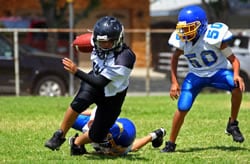Making Football Safe
PRACTICES TO MAKE FOOTBALL SAFER:
Prevention Tips that the Raiders are following:

- Expanding the availability of non-contact football programs.
- Having skilled athletic trainers available at games and practices.
- Keep a close eye on athletes during running plays, especially an athlete in the running back position.
- Enforce the rules of the sport for fair play, safety, and sportsmanship.
- Ensure athletes avoid unsafe actions such as:
- Hitting another athlete in the head;
- Using their helmet to contact another athlete (helmet-to-helmet or helmet-to-body contact);
- Making illegal contacts, tackling, or colliding with an unprotected opponent; and/or
- Trying to injure or put another athlete at risk for injury.
- Make sure athletes always wear a helmet that fits well and is in good condition.
- Work with the game or event administrator to remove tripping hazards and ensure equipment, such as goalposts, have padding that is in good condition.
DO THE RAIDERS DO THESE THINGS?
1. The West Edmonton Raiders follow strict concussion protocols and return to play procedures. Speak to one of our Trainers, or Board members for more information about our process.
2. Your Raiders purchase some new helmets each year. Helmets are used for 5 years and then re-certified for another 5 years if they are in good shape. Helmets that are damaged are repaired or replaced. Your fundraising efforts dictate the number of helmets that we are able to replace each season.
3. The Raiders currently do not implement a neck stabilization program, however, emphasis is placed on proper fitting equipment, optional equipment (i.e. neck guard and back guards) and proper tackling techniques to limit neck injury.
4. Mouth guards are mandatory for EVERY player EVERY time that they are on the field.
5. Coaches are encouraged to run non-contact practices regularly. While we often still wear the equipment, these practices have the same impact and intention as helmetless training.
